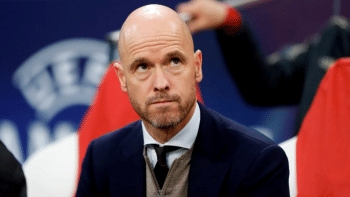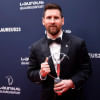Messi's 8th Ballon d'Or: Deserving or debatable?

Nothing in life is certain except death, taxes, and Lionel Messi winning the Ballon d'Or. But perhaps this time, it could have been a different name because Erling Haaland also made for a remarkable candidate.
Prior to Haaland's anticipated arrival at Manchester City, the team continuously fell short of winning the UEFA Champions League. So, when he was signed on, many believed that the messiah had finally arrived. Flaunting his long golden hair, Haaland made the already indestructible team even better. Suddenly, City transitioned from being a guaranteed Premier League title winner to pursuing one of the most elusive statistics in English football: the treble. The last and the only other time this was achieved was back in 1998 by their own noisy neighbours, Manchester United.
Haaland was the missing piece in City's stellar, star-studded team. Moreover, he seamlessly fit into the system, embracing all the pressure that would not typically be reserved for a 23-year-old. He was the top scorer, with 12 goals in the Champions League campaign, and his five-goal performance against Leipzig in the round of 16 matches was the talk of the town. Then, he also tore the Premier League apart. After 29 years, the king of English football Alan Shearer's 34-goal haul (a joint record with Andy Cole) was finally dethroned, with Haaland scoring 36 goals in the 2022/2023 campaign. Now, with 38 goals scored in 2023 alone, he is just one goal shy of breaking the record for the highest number of goals scored in a Premier League calendar year.
The numbers speak for themselves. When it comes to scoring goals, no one has been more clinical than Erling Haaland, and that is why he picked up the Gerd Müller Trophy, which is awarded to the top scorer of the year. But in the season when Haaland posted the most incredible numbers, Lionel Messi finally fulfilled his prophecy by winning the FIFA World Cup in Qatar.
For Messi, this was not just a World Cup victory; it was destiny that he had pursued too long in his illustrious career. It was the one trophy missing from his collection, and he won it in style. Seven goals and three assists in seven matches made Messi the best player of the tournament by a country mile.
Outside of the national team, Messi tallied up 20 goals and 20 assists in the 2022/2023 season with PSG. Nevertheless, there is the endless debate about the French league, Ligue 1, being far less competitive than the Spanish and English leagues. When you factor in PSG's line-up—featuring three of the greatest generational talents—they make the French league seem like a walk in the park.
This is where the dilemma with the Ballon d'Or arises. How do you balance a decision where two players are not necessarily on the same wavelength? Historically, the Ballon d'Or has been awarded to the best player from a championship-winning team, with additional weight given if your country wins a tournament.
Messi won the World Cup with Argentina, while Haaland's Norway did not even qualify. Does this not create an imbalance between their contributions to their repetitive national scenes? Is it even fair to blame Norway, a country that has limited significance on the world stage, for not winning the World Cup?
In contrast, PSG did not achieve anything out of the ordinary, and after the World Cup, Messi's situation at the club became somewhat hostile, leading to his eventual move to Inter Miami. Haaland, on the other hand, with the likes of Rodri, Ruben Dias, Bernardo Silva and Kevin De Bruyne aiding and abetting him, won the Champions League, defended their Premier League title, and clinched the FA Cup. That is extraordinary.
The most important point of the debate is that Haaland's performance reflects a stretch of a 12-month period during which he thumped goals from all angles, using every possible part of his body. Messi's performance was stellar for a period of six months, before he was made a scapegoat for PSG's early exit from the round of 16.
Then comes the debate of the positions they each play in. Messi inherited a freer role within the Argentina midfield, whereas Haaland was a sole number nine. His presence meant someone could finally finish all the beautiful lobs, crosses, and through balls from De Bruyne. However, using the argument of "but Haaland has x, y, and z on his team" does not really cut it in this debate, as both players have had the luxury of being surrounded by equally great mates at the club level.
Another counter argument is that Haaland did not score or make major contributions to City's semi-final and final matches in the Champions League. While that is factually correct, it still does not diminish his role in the season City had and the role his arrival played in elevating that missing mentality of optimism.
Too often, the debate posits that the Ballon d'Or is an individual's award and that a team's performance should not be a deciding factor when picking the awardee. Even then, both Haaland's and Messi's individual performances have been a hallmark this year. They both helped their respective countries and clubs attain the trophies most desired. Haaland is no longer second fiddle to Kylian Mbappe, and Lionel Messi is no longer a direct rival to Cristiano Ronaldo.
This debate will continue to ensue, as it remains a subjective matter of who deems what to be an extraordinary achievement or who felt most moved by which performance.
Football is all about romanticism; even the most cynical fan will admit this. For now, Haaland's biggest and perhaps only mistake in his young career so far is that he chose to have one of the greatest individual seasons at a time when romanticism is our only form of survival. Messi is football's greatest romantic story.
Raiyan Binte Rafiq is a sports columnist for The Daily Star. She is currently pursuing an LLM, while freelancing for INDIVISA. She also oversees recruitment at Next Level Sports Management based in Bangladesh.
Views expressed in this article are the author's own.
Follow The Daily Star Opinion on Facebook for the latest opinions, commentaries and analyses by experts and professionals. To contribute your article or letter to The Daily Star Opinion, see our guidelines for submission.

 For all latest news, follow The Daily Star's Google News channel.
For all latest news, follow The Daily Star's Google News channel. 









Comments